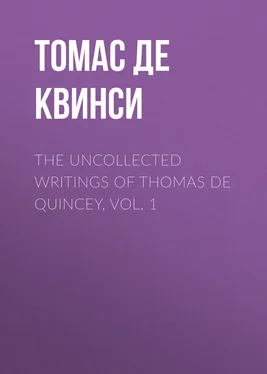Томас Де Квинси - The Uncollected Writings of Thomas de Quincey, Vol. 1
Здесь есть возможность читать онлайн «Томас Де Квинси - The Uncollected Writings of Thomas de Quincey, Vol. 1» — ознакомительный отрывок электронной книги совершенно бесплатно, а после прочтения отрывка купить полную версию. В некоторых случаях можно слушать аудио, скачать через торрент в формате fb2 и присутствует краткое содержание. Жанр: foreign_prose, literature_19, foreign_antique, на английском языке. Описание произведения, (предисловие) а так же отзывы посетителей доступны на портале библиотеки ЛибКат.
- Название:The Uncollected Writings of Thomas de Quincey, Vol. 1
- Автор:
- Жанр:
- Год:неизвестен
- ISBN:нет данных
- Рейтинг книги:4 / 5. Голосов: 1
-
Избранное:Добавить в избранное
- Отзывы:
-
Ваша оценка:
- 80
- 1
- 2
- 3
- 4
- 5
The Uncollected Writings of Thomas de Quincey, Vol. 1: краткое содержание, описание и аннотация
Предлагаем к чтению аннотацию, описание, краткое содержание или предисловие (зависит от того, что написал сам автор книги «The Uncollected Writings of Thomas de Quincey, Vol. 1»). Если вы не нашли необходимую информацию о книге — напишите в комментариях, мы постараемся отыскать её.
The Uncollected Writings of Thomas de Quincey, Vol. 1 — читать онлайн ознакомительный отрывок
Ниже представлен текст книги, разбитый по страницам. Система сохранения места последней прочитанной страницы, позволяет с удобством читать онлайн бесплатно книгу «The Uncollected Writings of Thomas de Quincey, Vol. 1», без необходимости каждый раз заново искать на чём Вы остановились. Поставьте закладку, и сможете в любой момент перейти на страницу, на которой закончили чтение.
Интервал:
Закладка:
The curious little Essay On Novels ,—written in a Lady's Album, had passed out of Mr. Davey's hands before I became aware of its existence. The facsimile , however, taken for The Archivist , by an expert like Mr. Netherclift, shows that it is, unquestionably, in the handwriting of De Quincey. I have been unable to trace the 'Fair Incognita' to whom it was addressed.
The compositions which were written for me when I edited Titan , and which I now place before the public in volume form, after the lapse of a whole generation (thirty-three years, to speak 'by the card'), demand some special comment, particularly in their relation to the Selections Grave and Gay .
Titan was a half-crown monthly Magazine, a continuation in an enlarged form of The Instructor . I had become the acting Editor of its predecessor, the New Series of The Instructor , working in concert with my Father, the proprietor. In this New Series there appeared from De Quincey's pen The Sphinx's Riddle , Judas Iscariot , the Series of Sketches from Childhood , and other notable papers.
At that time I was but a young editor—young and, perhaps, a little 'curly,' as Lord Beaconsfield put it. De Quincey, with a truly paternal solicitude, gave me much good advice and valuable help, both in the selection of subjects for the Magazine and in the mode of handling them. The notes on The Lake Dialect , Shakspere's Text and Suetonius Unravelled , were written to me in the form of Letters, and published in Titan .
Storms in English History was a consideration of part of Mr. Froude's well-known book, which on its publication made a great stir in the literary world, and profoundly impressed De Quincey.
How to write English was the first of a series projected for The Instructor . It never got beyond this 'Introduction,' but the fragment contains some matter well worthy of preservation.
The circumstances attending the composition of the four papers on The English in India and The English in China , I have explained at some length in the introductory notices attached to them.
And now for a confession! The 'gentle reader' may, perhaps, feel a momentary inclination to blame me when I reveal, that I rather stood in the way of some brilliant articles which were very seriously considered at this period.
De Quincey was eager to write them, and I should have been glad indeed to have had them for Titan , but for a fear of allowing the Author to wander too far from the ever-present and irksome Works . Any possible escape—even through other downright hard work, from this perplexing labour was joyfully hailed by him as a hopeful chance of obtaining a prosperous holiday.
For a little I wavered under the temptation (Reader,—was it not great?)—the idea of having a little relaxation which would permit some, at least, of these well-planned papers to be written. But I was keenly alive to the danger which overtook us at last. We are daily reminded that 'art is long and life is short.' I had already saved the Works from being strangled at their birth in a legal tussle with Mr. John Taylor. 2 2 This incident was a complicated contention, concerning the copyright of The Confessions , in which De Quincey had long allowed his rights to lie dormant. It was at last happily settled in an amicable manner.
My Father was at my elbow anxiously inquiring about the progress of the 'copy' for each succeeding volume. There were eager friends also, on both sides of the Atlantic, pressing resolutely for it. So—prudence prevailed, and we held as straightly on our way as the Author's uncertain health would permit.
Thus it came to pass, dear Public, that you lost some charming essays, while you gained the fourteen volumes of the Selections which the Author all but completed.
Wherefore, seeing that you may possibly expect it of me to make some use of my rare opportunities by doing whatever I can in these matters, 'before the night cometh,'—I have prepared this book— ohne hast, ohne rast .
I cannot close these few pages better than by quoting some strong, just, sympathetic words which appeared in two great reviews—one American, the other British.
The North American Review said:—
'In De Quincey we are struck at once by the exquisite refinement of mind, the subtleness of association, and the extreme tenuity of the threads of thought, the gossamer filaments yet finally weaving themselves together, and thickening imperceptibly into a strong and expanded web. Mingled with this, and perhaps springing from a similar mental habit, is an occasional dreaminess both in speculation and in narrative, when the mind seems to move vaguely round in vast returning circles. The thoughts catch hold of nothing, but are heaved and tossed like masses of cloud by the wind. An incident of trivial import is turned and turned to catch the light of every possible consequence, and so magnified as to become portentous and terrible.'
'A barren and trivial fact, under the power of that life-giving hand, shoots out on all sides into waving branches and green leaves, and odoriferous flowers. It is not the fact that interests us, but the mind working upon it, investing it with mock-heroic dignity, or rendering it illustrative of really serious principles; or, with the true insight of genius, discovering, in that which a vulgar eye would despise, the germs of grandeur and beauty; the passions of war in the contests of the rival factions of schoolboys, the tragedy in every peasant's death-bed.'
'De Quincey constantly amazes us by the amount and diversity of his learning. Two or three of the minor papers in the collected volumes are absolutely loaded with the life spoils of their author's scholarship, yet carry their burden as lightly as our bodies sustain the weight of the circumambient atmosphere. So perfect is his tact in finding, or rather making a place for everything, that, while inviting, he eludes the charge of pedantry.'
'It is scarcely to be expected that one who tries his hand at so many kinds of pencraft should always excel; yet such is the force of De Quincey's intellect, the brilliancy of his imagination, and the charm of his style, that he throws a new and peculiar interest over every subject which he discusses, while his fictitious narratives in general rivet the attention of the reader with a power not easily resisted.'
The Quarterly Review said:—
'De Quincey's style is superb, his powers of reasoning unsurpassed, his imagination is warm and brilliant, and his humour both masculine and delicate.'
The writer continues:—
'A great master of English composition, a critic of uncommon delicacy, an honest and unflinching investigator of received opinions, a philosophic inquirer—De Quincey has departed from us full of years, and left no successor to his rank. The exquisite finish of his style, with the scholastic vigour of his logic, form a combination which centuries may never reproduce, but which every generation should study as one of the marvels of English Literature.'
James Hogg. London, February, 1890.A BRIEF APPRAISAL OF THE GREEK LITERATURE IN ITS FOREMOST PRETENSIONS:
By way of Counsel to Adults who are hesitating as to the Propriety of Studying the Greek Language with a view to the Literature; and by way of consolation to those whom circumstances have obliged to lay aside that plan.
No. I
No question has been coming up at intervals for reconsideration more frequently than that which respects the comparative pretensions of Pagan (viz. Greek and Roman) Literature on the one side, and Modern (that is, the Literature of Christendom) on the other. Being brought uniformly before unjust tribunals—that is, tribunals corrupted and bribed by their own vanity—it is not wonderful that this great question should have been stifled and overlaid with peremptory decrees, dogmatically cutting the knot rather than skilfully untying it, as often as it has been moved afresh, and put upon the roll for a re-hearing. It is no mystery to those who are in the secret, and who can lay A and B together, why it should have happened that the most interesting of all literary questions, and the most comprehensive (for it includes most others, and some special to itself), has, in the first place, never been pleaded in a style of dignity, of philosophic precision, of feeling, or of research, proportioned to its own merits, and to the numerous 'issues' (forensically speaking) depending upon it; nor, in the second place, has ever received such an adjudication as was satisfactory even at the moment . For, be it remembered, after all, that any provisional adjudication—one growing out of the fashion or taste of a single era—could not, at any rate, be binding for a different era. A judgment which met the approbation of Spenser could hardly have satisfied Dryden; nor another which satisfied Pope, have been recognised as authentic by us of the year 1838. It is the normal or exemplary condition of the human mind, its ideal condition, not its abnormal condition, as seen in the transitory modes and fashions of its taste or its opinions, which only
Читать дальшеИнтервал:
Закладка:
Похожие книги на «The Uncollected Writings of Thomas de Quincey, Vol. 1»
Представляем Вашему вниманию похожие книги на «The Uncollected Writings of Thomas de Quincey, Vol. 1» списком для выбора. Мы отобрали схожую по названию и смыслу литературу в надежде предоставить читателям больше вариантов отыскать новые, интересные, ещё непрочитанные произведения.
Обсуждение, отзывы о книге «The Uncollected Writings of Thomas de Quincey, Vol. 1» и просто собственные мнения читателей. Оставьте ваши комментарии, напишите, что Вы думаете о произведении, его смысле или главных героях. Укажите что конкретно понравилось, а что нет, и почему Вы так считаете.












